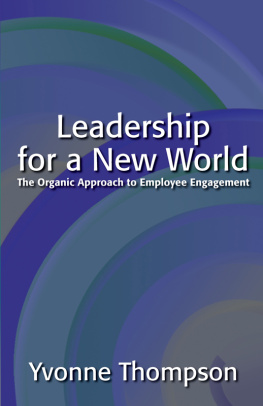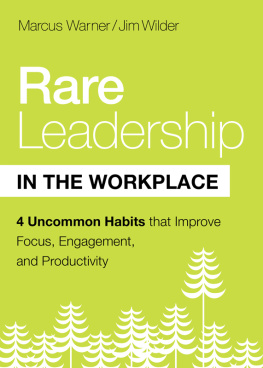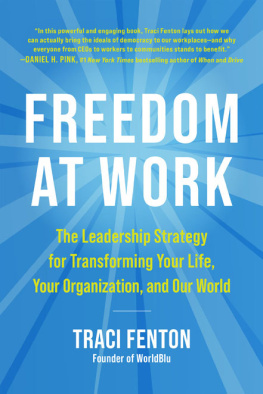And suddenly you know: Its time to start something new and trust the magic of beginnings.
I remember the first time I interviewed to become a supervisor. I flew from Seattle to interview for a job in New Jersey. After two days of learning about the job with the factory manager, Dave, we ended up in the hotel bar at about 11 p.m. I had already decided that this job and the notion of leaving Seattle for New Jersey werent what I wanted. But then Dave said, Paul, the truth is that you will have better opportunities than this one, but I need you, and the people in this factory need you. I hope you will give us a chance.
Most of us are drawn to people who are willing to be honest and vulnerable with us. We also want to contributeto make a difference. I accepted, and I loved working for Dave.
Dave was sincere, authentic, and caring. He was also no-nonsense. I never worried about telling him the truth, probably because he always told me the truth.
There is an old saying: People dont quit their job; they quit their boss . If they cant physically leave, they check out mentally. Its just too difficult to keep working at your full potential for someone you dont respect or who doesnt seem to be on your side.
All of us, when we first think about becoming a supervisor, dream about being really wonderful. Then for many of us, that dream slips away or gets pushed into the background. Being a supervisor is tough. Lets just acknowledge that fact and get back to work on turning our dreams into reality.
It all begins with intention. The best people to work for are the ones who want to be great with people. Intention comes before skill building. Simply keep your intention alive and let it guide you. If you bring your intention to be a remarkable supervisoralong with a willingness to try and fail and try againthis book will show you how to make it happen.
Let us all be the leaders we wish we had.
Introduction
Lead with CompassionThe Perspective of Caring
We have to choose to slow down, to actually see the time and space we are into truly see people and accept them in their priceless moments.
Jodi Hills, artist and writer
We can never know what people are dealing with in their private lives. People are often on the edge of some struggle. Life can be full of anxiety and stress and loneliness. According to a 2006 study by Duke University, people have fewer friends these days, and many people have no one with whom to talk when they need a confidant.
We, as leaders, should not expect to replace family and friends, but we can help fill the void. Work can be a place of comfort if supervisors lead with compassion.
People Need to Know You Care
I like the term wholeheartedness . It means you hold everyone in high regard, you see the best in people, and you recognize that everyone wants to be seen and treated as being unique and relevant.
You understand that people are complex and that their lives are complicated. You never presume to know how it is for anyone else, yet you want to get to know the people who work for you.
Caring means having peoples backs, giving them the benefit of the doubt, and taking blame out of the equation.
You can be compassionate and still expect a lot from peoplesometimes more than they see themselves as capable of doing. Being demanding and caring are not mutually exclusive; they complement each other.
My first supervisor, Kurt, was kind and easygoing. He had this mindset that if he hired you, he was responsible for you for the next twenty years, and he interacted with everyone from that point of view.
Id been working for Kurt for about five weeks when he came in one late Friday afternoon and said, Paul, Ive been in fifteen meetings with you so far, and you havent spoken yet. Thats unacceptable. So starting Monday, if you dont speak twice during a meeting, at the end of the day, I will fire you. Have a nice weekend.
Then the following Monday morning, he said, You know that what I said holds; you are on probation. You are the key engineer in most of these meetings, and if you dont speak, youve added no value. So start speaking, or I will let you go.
I rose to his expectations, and I took four lessons away from the experience. The first was obvious and immediate: if you dont speak in a meeting, you dont add value. The other lessons occurred over time:
Supervisors who care will tell you the truth, trusting that you can handle it.
We all have weaknesses that can be overcome.
Being nice in the short term isnt kind in the long term.
We all take lessons away from our teachers, coaches, and supervisors. The best leave us with more ability and capacity than when we first met them.
This book presents a range of tools that support you in becoming a supervisor who leads with compassion. In some ways, compassion is simpleit is caring. Its a trait we all have access to; we just need to pull it out of the background and into the foreground where it can shape our interactions with others.
You are reading this book, so your journey has already begun. Highlight the ideas and sentences that resonate with you. Look for things you can begin doing today. Each chapter ends with a suggestion about what you might put into practice. Here is the first.
The Compassionate Move
With respect to caring, what do you already know how to do that could make a difference to people working for you? Take a minute and write down five things you can do. Start there.
A human moment occurs anytime two or more people are together, paying attention to one another.
Edward M. Hallowell, American psychiatrist
Compassionate Principle 1
Perspectives Change Everything, So Choose Empowering Ones












